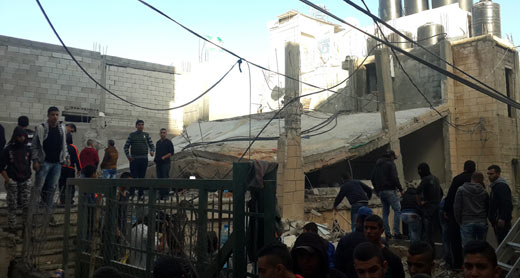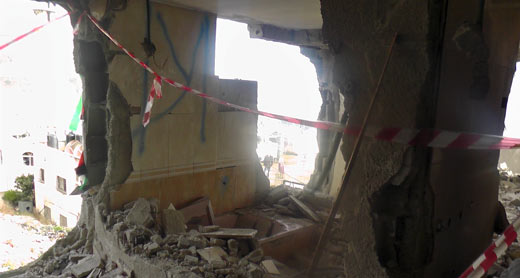Israeli security forces continue blasting homes with HCJ approval, demolishing other nearby homes in the process
Published:
7 Dec 2015
On the night of 3 December 2015, Israeli military forces entered Nablus and blew up the home of Ragheb ‘Aliewa’s wife and two-year-old son. ‘Aleiwa is accused of involvement in the attack in which Na’ama and Eitam Henkin were killed on 1 October 2015. The demolition was carried out subsequent to the 1 December 2015 ruling by the High Court of Justice (HCJ). In a majority decision, the HCJ dismissed the petition filed by the family and human rights organization HaMoked: Center for the Defence of the Individual against the demolition. The explosive blast in the family’s apartment, located on the second floor of a four-story building, damaged other apartments in the building as well. The adjacent apartment, where Ragheb’s brother, Raed ‘Aliewa lived with his wife and their three young children (all minors) was completely destroyed and is no longer habitable. Damage was also caused to two apartments on the first floor, where ‘Aleiwa’s parents live as does another brother with his wife and children.
On the previous day, 2 December 2015, a large complement of police and military personnel entered Shu’fat R.C. in East Jerusalem and blew up the family home of Ibrahim ‘Akari, who killed Jad’an As’ad, a Border Police officer, and Shalom Aharon Ba’adani, by ramming his car into them on 5 November 2014. ‘Akari himself was shot to death during the incident by a Border Police officer. On 1 December 2014, the HCJ dismissed the petition filed by ‘Akari’s wife Amira ‘Akari, his brother Mansur ‘Akari and HaMoked against the demolition order issued for the apartment occupied by Amira ‘Akari and her five young children (all minors), which is located on the top floor of a three-story building. The state failed to meet the undertaking it gave before the HCJ that “all required measures will be taken by the respondent to minimize possible damage to the apartments adjacent to the terrorist’s apartment”. The explosion caused serious damage to three adjacent apartments which are no longer habitable and left another 14 additional, including seven minors, without a home.
In the last two demolitions, the damage Israeli authorities caused to six adjacent apartments was so extensive as to render them inhabitable. As a result, 27 people -including 16 minors - who stand accused of no wrongdoing were left homeless.
Even without damage to adjacent homes, the demolition or sealing of homes is a draconian, vindictive measure and is used against entire families who have done nothing wrong, and are suspected of no wrongdoing. B’Tselem has previously documented the destruction of homes adjacent to those slated for demolition by explosives. Acomprehensive report B’Tselem published in 2004 revealed that 295 homes, about half of the homes destroyed between 2001 and 2004, were homes that were never alleged to house individuals who perpetrated attacks against Isarelies. This left 1,286 people homeless, in addition to those whose home Israel explicitly slated for demolition.
Since 1967, when the West Bank was occupied, the military has demolished and sealed hundreds of homes as a punitive measure against relatives of Palestinians who had harmed Israelis or were suspected of doing so. This policy has left thousands of people, including young children, homeless, though they themselves were not suspected of any offense, nor was anything alleged against them. In 2005, the military discontinued this policy, after a committee appointed by the security establishment reached the conclusion that its disadvantages outweighed its advantages. Home demolitions resumed in July 2014 shortly after the kidnapping and killing of three Yeshiva students in the Bethlehem area. Israeli authorities argued that the resumption was justified given the radical change in circumstances. As of October, Israel has stepped up its use of punitive house demolitions. In October, authorities blew up three homes, destroying two adjacent apartments in the process, and also sealed one apartment. In November, Israeli authorities demolished 14 homes, eight of which were not slated for demolition. Following the demolitions of the last few days, the number of apartments demolished or sealed by the Israeli authorities since early October has reached 26. Most (14) of these homeswere not the subject of demolition/sealing orders.
The justices of the Supreme Court repeatedly allow the state to use this drastic measure, which constitutes collective punishment and is prohibited under international law. They do so despite the severity of the measure and the clear position of legal scholars both in Israel and abroad that it is unlawful. The justices continue to take at face value the state’s pledges that every effort will be made to avoid the destruction of other homes, even though more than half of the apartments demolished over the past two months had not been the subject of orders. The court itself ruled that judicial review is required whenever house demolitions are used as a punitive measure. However, since the ruling was made, the court has approved almost every single case brought before it. This cannot pass for judicial review, nor is it what judicial review is meant for. The court is expected to prevent the state from acting unlawfully, but when it comes to punitive house demolitions, with or without an order, it fails to fulfil its role.



هیچ نظری موجود نیست:
ارسال یک نظر